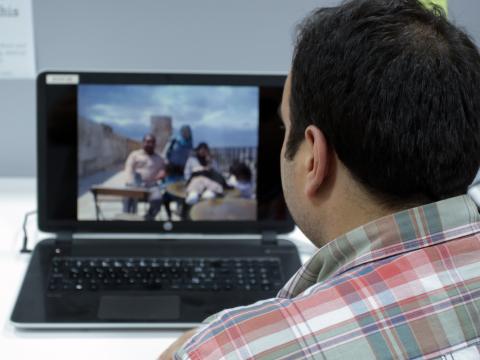Q&A with Syrian aid worker in Turkey

What is your name and age?
My name is Ahmad, I am 33.
Can you please tell me about your background, where were you born in Syria, where were you living, what was your job, what was your life like in Syria? Were you happy?
I lived in Aleppo before the conflict with my wife and children. I was an instructor at the University of Aleppo and I used to teach English in private institutions. I used to work much less hours than I do now and we spent very happy summers going to farms and to the sea with extended family, where we swam, sang and where our children had memorable experiences.
However, I was always concerned about the rapidly increasing cost of living, the dramatic increase of corruption in the country, and the inclination towards privatisation of essential services like education, water and electricity. Therefore, I was constantly looking for ways to increase my income to bridge the widening gap, hardly succeeding in that.
My children were surrounded with love and attention: my wife was surrounded with her family and I had lots of friends and students. We were happy, with some concerns about the future of course.
Why did you leave Syria?
In the middle of 2012, the fighting arrived in my neighbourhood in Aleppo and I had to evacuate to my in-laws's house. When the fighting had gone on for more than a month, I lost hope of going back to my home, where I had to leave all my possessions. While the security situation deteriorated significantly, I became more concerned about money as I became jobless. In October 2012, a friend of mine called from Turkey telling me he had a job for me with an INGO. Before then I had never thought to leave Syria. I moved to Turkey without a passport. My family feels much more secure now, I have a job and I am able to feed them.
What was your journey like? Where did you end up? How is your life different? Are you happy?
Leaving our possessions, families and country was not as easy as we thought. We cried on the way to Turkey. While my wife had a passport, the procedures took about half an hour to get her through. I was smuggled into Turkey in five minutes. I ended up working in the humanitarian sector in Turkey with little hope of going back to Syria.
When I think of myself having a job, a good rented house, and a car, I think I am happy. But the fact that I have become short-fused, with chronic fatigue and depression is telling me that I am missing something that cannot be measured in concrete terms. I am also very concerned about the future of my children. What language should they learn/speak? Where will they end up? Are we going back to Syria? Are we going to be nationalised here?
What are your thoughts on leaving Syria? Do you miss your home? Do you still have family there?
After all this is not my country. Few understand why I came here. The word “Syrian” is used here most often with lots of derogatory connotations. I can take it because millions of Syrians are way less fortunate. However, I do not wish my children to suffer for it. We do miss Syria. We know that once the fighting is over, we will go back there. I have no direct family members left in Syria.
How is your life now? What are you doing? Are you able to work? Do you feel safe? Do you feel at home?
With thanks to the Turkish government, I have the right to work and I am working with World Vision now. I do feel safe but I do not feel at home for sure. Syrians are stigmatised here and there are some restrictions on movement of refugees which personally make me feel suffocated at times.
What can other countries do to help refugee families and children going through this crisis?
I wish for other countries to contribute to ending the conflict and to provide humanitarian assistance to vulnerable Syrians in Syria, Lebanon, Jordan and Turkey.